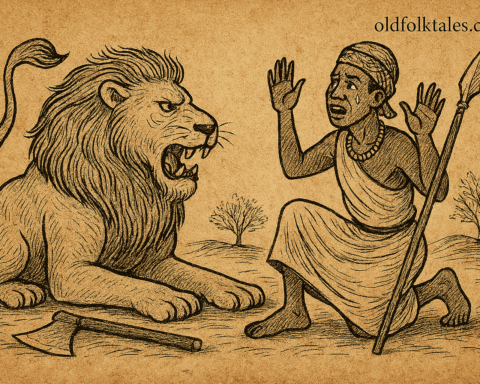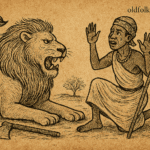In the land where the lions dwelled, a great famine once swept across the earth. Food grew scarce, and hunger gnawed at every creature. The lions gathered to discuss their plight, for the forests and plains no longer provided meat. “How shall we survive?” they asked one another. “Men always have their cattle. But how can we reach them? Their camp is but one day’s journey from here.”
Thus, the lions devised a plan. They chose the daughter of a lioness, a young lioness herself, and transformed her into the likeness of a beautiful human woman. They dressed her in fine garments, braided her hair with care, and gave her instructions:
“You shall pass through the village of Ngana Kimona-Ngombe kia na Mbua, the man of many cattle. When he sees you, he will surely desire you as his wife. You must accept. When he marries you, kill him. Then we shall come and feast upon his cattle.”
ALSO READ: The Blacksmith and the Blackbirds: A Kimbundu Folktale
The lioness agreed to their plot. She set out and soon reached the outskirts of Kimona-Ngombe’s homestead, where she found him seated on the threshold of his house.
He looked at her and asked, “Young woman, where are you going?”
“I travel to visit my brother,” she replied sweetly. “I am weary. Might I have a little water to drink?”
They gave her water. Kimona-Ngombe, struck by her beauty, asked again, “Young woman, are you married?”
“Not yet,” she answered.
He proposed marriage at once, and she agreed yet said she must first tell her parents. She promised to return in two days.
At home, she told her kin, “Kimona-Ngombe has asked for me as wife.” The lions rejoiced, saying, “That is well.” Two days later, she returned. Kimona-Ngombe welcomed her warmly, slaughtered a goat for her to eat, and built a house for his new bride.
That night, Kimona-Ngombe declared, “I will sleep in my bride’s house.” But his young son, Ndala ja Kimona-Ngombe, clung to him, crying, “I will sleep with you, Father!” His mother tried to keep him back, but the child wailed until his father relented. Together, they entered the bride’s house.
At midnight, while father and son lay sleeping on the ground, the young lioness rose from the bed. She shed her human guise and became a lioness once more, ready to strike. But Ndala, lying behind his father, saw her. He shook his father urgently: “Father, something on the ground is biting!”
Startled, Kimona-Ngombe awoke, and the lioness swiftly became a woman again. Morning came without harm.
The next night, Kimona-Ngombe returned again with his son. The bride frowned. “Why bring the child once more? He disturbed you before.”
“My son will not leave me,” the father replied.
As they lay down, voices from afar called the lioness: “You, who went to kill Kimona-Ngombe, why do you not return?”
She answered in a chant:
“The goat of Kimona-Ngombe is asleep;
The slave of Kimona-Ngombe is asleep;
The hen of Kimona-Ngombe is asleep;
The pig of Kimona-Ngombe is asleep;
The sheep of Kimona-Ngombe is asleep;
Kimona-Ngombe himself is asleep;
But Ndala ja Kimona-Ngombe has no sleep on his face, pooh!”
Then she turned once more into a lioness, ready to strike. But again, Ndala cried out, “Father, rise! A wild beast is here!”
Kimona-Ngombe, annoyed, dismissed him. “It is a new house. What beast can there be? You lie, child.”
But Ndala insisted, “There are maggots and roaches on the ground.” His father scolded him for disturbing his sleep.
A little while later, the lions again called for their daughter. Once more she answered, repeating her chant, ending with:
“But Ndala ja Kimona-Ngombe has no sleep on his face, pooh!”
This time Ndala begged his father, “Father, let us leave! Your wife is turning into a beast.” Kimona-Ngombe doubted him, but at the boy’s urging he pretended to sleep and watched.
Soon he saw with his own eyes, the bride transformed into a lioness. At last, he believed his son. He quickly took Ndala and returned him to his mother.
That very night, he summoned his household and slaves: “Surround the bride’s house with fire! The woman I married turns into a lioness.” They set the house aflame, and by dawn the lioness lay dead, consumed by fire.
And so, the saying was remembered: “Begetting is truth.” Though Kimona-Ngombe might not have believed, it was his son, Ndala, who saved his father’s life.
Moral Lesson
This tale teaches the importance of vigilance, truth, and trust in even the youngest voices. Wisdom and courage are not measured by age, for Ndala’s persistence revealed what his father could not see. The story warns against deceit and reminds us that evil often hides behind beauty. Yet it also celebrates the saving power of attentiveness, honesty, and courage.
Knowledge Check
1. Who devised the plan to deceive Kimona-Ngombe?
The lions, during a famine, sent a lioness disguised as a woman.
2. Why did the lions choose Kimona-Ngombe?
He was known as a wealthy man with many cattle.
3. How did the lioness attempt to carry out the plan?
She disguised herself as a woman, married Kimona-Ngombe, and tried to kill him at night.
4. Who saved Kimona-Ngombe from the lioness?
His young son, Ndala, who stayed vigilant and warned his father repeatedly.
5. What does the repeated chant in the story symbolize?
It showed that all in Kimona-Ngombe’s household were vulnerable except Ndala, who remained alert.
6. What is the main lesson of the folktale?
To value vigilance, believe truth even from children, and beware of beauty that conceals danger.
Source: Kimbundu folktale, Angola (from Folktales of Angola by Heli Chatelain, Smithsonian Libraries).







